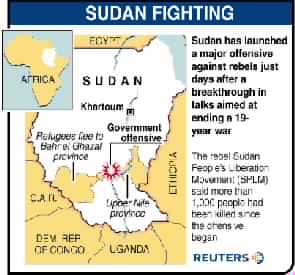HIGHLIGHTS: Reports Speak of Hundreds Killed in Fighting||A Kenyan Aid Worker Reportedly Killed by Government Forces||Khartoum Government Denies Killing Civilians|| STORY: Sudanese government-backed forces killed a foreign aid worker and abducted three others in an oil-rich area of Sudan, a U.N. official said Tuesday. A rebel leader said the government killed some 1,000 civilians in a separate attack in the same region.
Word of the alleged abductions and killings came just one week after a major breakthrough in peace talks to end the African country's 19-year civil war. The rebels took up arms against the government in 1983 and are seeking autonomy for the largely animist and Christian south.
A spokeswoman for World Vision, an international Christian aid organization, said Tuesday that the World Vision workers were attacked Monday at Waat, 510 miles south of the capital of Khartoum. Alison Preston refused to identify the attackers and insisted three workers - a Kenyan and two Germans - were simply missing. Charles Kibbe, a Kenyan World Vision employee, was killed in the attack.
However, Keith MacKenzie, a senior official with a U.N. umbrella organization for southern Sudan, said the three workers had been abducted by a government-allied militia. U.N. officials and German diplomats were working to secure their release, he said.
German Foreign Ministry officials in Berlin said it was unclear whether the aid workers had been abducted and that its embassies in Khartoum and Nairobi were investigating.
A fifth aid worker, also Kenyan, managed to hide from the assailants and was evacuated, Preston said.
Sudanese government officials were not immediately available for comment on the abduction.
MacKenzie also said that government forces had overrun Tiam, a town 435 miles southeast of Khartoum that is held by rebels of the Sudan People's Liberation Army. He did not have further details.
In Khartoum, Ghazi Salah Eddin Attabani, the Sudanese government's peace adviser, denied in a statement that any civilians in Tiam had been attacked by the army. He did not explicitly say whether Tiam had been attacked.
However, SPLA spokesman Samson Kwaje said soldiers backed by helicopter gunships attacked Tiam on Friday, forcing the 250 SPLA troops there to retreat.
Nearly all the town's 3,000 civilians were trapped during the attack, he said. The few people who managed to escape said that at least 1,000 others were killed by the government soldiers, Kwaje said.
Kwaje said he was "puzzled" why the government would launch an attack and kill civilians so soon after agreeing to a framework peace agreement.
However, he said "this is the usual area where they clear people for oil fields."
Most of the country's oil reserves lie along a line that divides the north from the south.
At least 2 million people have died, mainly through war-induced famine, and another 4 million have been displaced in the conflict.
Under the recently accepted framework for peace talks, signed July 20 in Kenya, the government of President Omar el-Bashir agreed that the Sudanese constitution would be rewritten to ensure that sharia would only be applied in the north, and not to non-Muslims in the south. He had vowed to create an Islamic state after seizing power in 1989.
It was also agreed that six years after the full peace agreement is signed, people in the south, where an estimated five percent of the population is Christian and the remainder follow traditional beliefs, would vote whether to remain part of Africa's largest nation or seek independence.
PHOTO CAPTION
Sudan has launched a major offensive against rebels in the south just days after announcing a breakthrough in talks aimed at ending their 19-year war, aid workers and rebels said on July 30, 2002. The rebel Sudan People's Liberation Army (SPLA), which made a deal with Khartoum on July 20 resolving the war's two key issues, said more than 1,000 people had been killed since the government began its attack in Western Upper Nile region. (Reuters
- Author:
& News Agencies - Section:
WORLD HEADLINES


 Home
Home Discover Islam
Discover Islam Quran Recitations
Quran Recitations Lectures
Lectures
 Fatwa
Fatwa Articles
Articles Fiqh
Fiqh E-Books
E-Books Boys & Girls
Boys & Girls  Hajj Rulings
Hajj Rulings Hajj Fatwas
Hajj Fatwas














